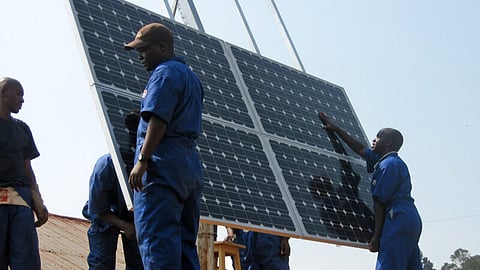
- Union Budget 2026
- Home
- NewsGram USA
- India
- न्यूजग्राम
- World
- Politics
- Entertainment
- Culture
- Lifestyle
- Economy
- Sports
- Sp. Coverage
- Misc.
- NewsGram Exclusive
- Jobs / Internships

By Jean Sovon and Vivian Wu
China is positioning itself as the world’s champion for renewable energy and has been heavily investing in the sector for the last 20 years. On the other hand, in order to support its renewables sector and consolidate the supply chain, it has also been financing mega-projects that exploit natural resources such as coal and oil — particularly in Africa.
Between development, dependence, and the energy transition, some environmentalists worry that China is playing a double game that is harming Africa in its fight against environmental injustice.
Even though Africa has historically been one of the lowest emitters and therefore has negligibly contributed to the climate crisis compared to Europe, China, and North America, it is still one of the most at-risk regions when it comes to climate disasters and consequences.
On the continent, experts are implementing initiatives to combat climate change and mitigate its negative effects, even as mitigation measures are difficult to implement due to a lack of resources.
In this context, it is receiving significant support from China, which is positioning itself as a strategic partner of the continent by promising investments that could enable Africa to begin its green energy transition, thereby making its energy grid more resilient. During a tour of Africa in January 2025, Wang Yi, China's Minister of Foreign Affairs, told the Chinese media:
For over 20 years, China has built up its industrial capabilities and supply chains around environmental protection and green development, supplying more than 70 percent of the world's wind power equipment and 80 percent of its photovoltaic components. The Chinese minister reiterated his country's clear commitment to prioritizing Africa’s green transition and cited the installed capacity of photovoltaic power plants built jointly by China and Africa, which amounts to more than 1.5 gigawatts. He told the Chinese media:
However, alongside these green initiatives and actions in Africa, China remains the world's largest emitter of carbon (CO2), accounting for more than 30 percent of emissions of this highly environmentally damaging gas. Likewise, China continues to be heavily involved in investing in and exploiting dirty energy sources on the African continent. It has invested heavily in oil extraction in several countries, notably Niger, Uganda, and Angola. It remains a regular customer for oil imports from Chad, Congo, and Nigeria.
China's interest in exploiting oil fields on the African continent clearly demonstrates its challenging position: its growing industries require more and more fossil fuels, despite a long-term desire to position itself as a major promoter of green energy worldwide.
Given its long history of exploitation and colonialism, Africa's most-needed resource is autonomy. Some scholars have raised concerns that under the current model, large loans from China are further increasing its debt and putting some African countries in impossible financial positions. In an analysis published in November 2023, Jana de Kluiver, a researcher specializing in Africa at the Institute for Security Studies, warned of growing concerns about Chinese loans in Africa:
Given these private interests, it is clear that the partnerships offered to African countries by Chinese enterprises to deal with the disastrous consequences of climate change have their limitations. This creates real economic dependence, which limits Africa's long-term climate policy options.
The numerous projects implemented with Chinese support have enormous consequences and local impacts. Massive population displacements benefit Chinese companies that set up shop to carry out projects. Deforestation and environmental degradation are detrimental to the livelihoods of local and vulnerable communities. Between inequalities and responsibilities, climate injustice is becoming increasingly glaring.
The FILIMBI citizen movement, a Democratic Republic of Congo (DRC)-based pro democracy movement, spoke out against this dynamic in November 2024. According to an article by Projet AfriqueChine, the movement points the finger at Chinese illegal gold miners in the region for polluting the Arwini River in the northeast of the country. On its social media account X, it posts:
Reparations for the damage caused to populations are negligible or virtually non-existent, and China is hardly involved in these matters, even if only to contribute to mitigating the impacts.
Between promises of a greener Africa and the continued exploitation and use of carbon, coupled with the vulnerability of populations who, in addition to suffering the consequences of climate change, face social damage such as famine and lack of housing, the continent finds itself caught in the middle of conflicting interests.
How can the continent reconcile the Sino-African partnership with respect for the principles of environmental justice? Chinese investment in Africa must offer real, sustainable development, not reinforce a new carbon dependency.
A stronger win-win partnership between the two parties, requiring technology transfer or knowledge sharing accompanied by local technical training for Africans, must be promoted. As Médéric Beugré, investigative journalist quoted by Le Nouveau Reporter in June 2025, points out:
Otherwise, African countries must be able to develop and promote their own technologies in order to hope for fair cooperation.
(GlobalVoices/NS)
This article is republished from GlobalVoices under a Creative Commons license. Read the original article.
Also Read:
